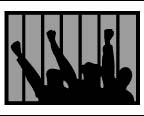|
FORMER DEATH ROW INMATE SPEAKS ON CAMPUS
The logo of the Campaign to End the Death Penalty NEWS By LAUREL LUNDSTROM The Terrapin Times Guest Writer
|
||
|
Former California death row inmate Shujaa Graham spoke to a group of students in the Armory on Thursday, October 16 as part of Death Penalty Awareness week. “An eye for an eye will make the world go blind," said Graham. "I don't want us to be those blind people." The event - focused on capital punishment in Maryland - was sponsored by the “Campaign to End the Death Penalty.” Student representatives, John Coursey and Rachel Yood organized the event in hopes of increasing student awareness and activism. Over the past 3 years, the death penalty issue in Maryland has been placed in the spotlight. Former governor Parris Glendening commissioned a major report in 2000 in response to concerns that the state's death penalty is meted out unfairly according to race and jurisdiction. A study conducted in 2003 looked at nearly 6,000 homicides from 1978-1999 and proved that race affects the way death penalty cases are handled in Maryland. As of last May, all executions in Maryland were suspended. The moratorium was supposed to be lifted when current Governor Bob Ehrlich was inaugurated, but executions remain at a standstill. Mike Stark, a representative and spokesperson for the “Campaign to End the Death Penalty" outlined conclusive statistics: "There are 10 men on Maryland's death row. Six of those men are black. One hundred percent of Maryland's death row is convicted of killing whites; one hundred percent of the blacks on death row are convicted of killing whites." "You are twelve times more likely to be given the death penalty in Maryland if you are a black who kills a white. The correlation is stronger than a smoker getting a heart attack," said Stark. Shujaa Graham, who was sentenced to death row in California, was released from prison when he was later proclaimed innocent. Graham spoke to students in order to provide a living example of how an innocent man was almost put to death by the state. Graham grew up in South Central Los Angeles. In 1965, Graham's neighborhood was brought under martial law and policed by the National Guard. "It was there that I began to realize the reality of my oppression," said Graham. Graham said that he joined the Black Panther Party to fight against the racist oppression he was encountering and was eventually sent to prison for his involvement with the party. "I was known as a leader and a trouble maker in prison, because I was doing everything that I could to fight for prisoner's rights and disrupt regular activity of the prison," said Graham.
|
Graham was convicted of murdering a prison guard in 1973. He sat on death row for four years, underwent four long trials and was finally exonerated in 1977. His exoneration was only granted with the help of a group of young attorneys who were willing to work for next to nothing to prove Graham was innocent. Graham spoke sullenly: "Time beat me down and my life had been destroyed." Little description was given to the details of Graham's life behind bars. His tears were the only detail the audience needed. "Not a day goes by when I don't think about capital punishment," said Graham. Graham reached out to students at the University of Maryland for a reason. Maryland is a key state in the current death penalty debate. Executions are at a standstill until they rule on the Stephen Oken case. This past March, Oken, one of Maryland's death row inmates, was issued a stay of execution by the Maryland Court of Appeals. Oken challenged the constitutionality of Maryland's capital murder statute and succeeded. "We need to tell Ehrlich not to restart executions in Maryland," said Stark. Groups like the Campaign to End the Death Penalty and Amnesty International are doing their best to increase awareness. Coursey suggested that students work toward passing a resolution at the University of Maryland to end the death penalty. "There are more people currently on death row than at any time in our history," said Stark. Students are doing their part to speak out. On Saturday, October 18, 40 people met at the Stamp Student Union and headed to Baltimore's super max prison. "We were able to celebrate the ruling made earlier that morning regarding Kenny Collins, a death row inmate in Maryland that we have worked with for a number of years. Kenny wasn't adequately represented by his trial lawyers and the prosecution ruled in his favor. Collins was granted a new sentencing hearing and maybe a new trial," said Coursey. The Collins ruling is just one small step to Graham's dream. "I want to see, in my lifetime, once and for all, capital punishment ended throughout the world," said Graham. Graham seated himself wiping away one last tear in hopes of not allowing students to walk away unsympathetic to his message.
|
|
